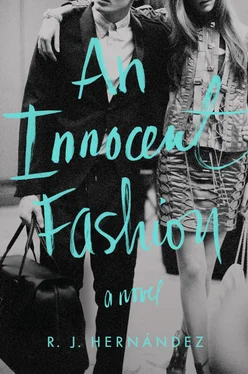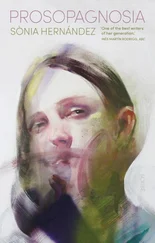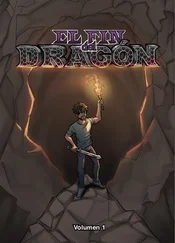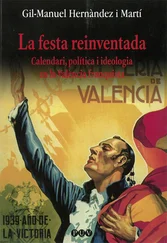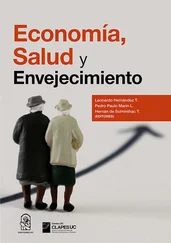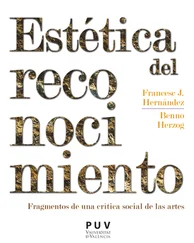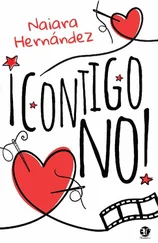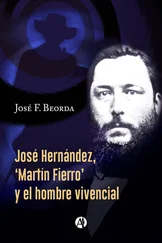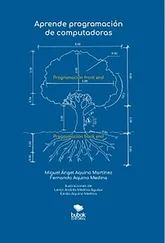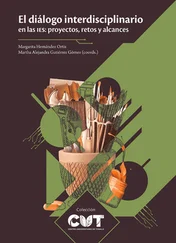It’d be a nice alternative to dying , I thought, opening my eyes — just as the elevator doors concluded otherwise, and closed.
EDMUND’S MAID HAD HER BACK TO ME WHEN I STEPPED INTO the foyer of his apartment.
“ Hola, Rosita ,” I said as she dusted a coffee table tome on Linda Evangelista, to which my boss Edmund had written the foreword. I gently set down Edmund’s package on the table beside Linda’s apathetic visage, and Rosita hefted herself around to greet me.
“You wet, E-tan!” she gasped, despite my frequent insistence that she not trouble herself over the pronunciation of my name. Like a brown-skinned Lady Liberty leading the revolutionaries, she swirled her feather duster in the air and waggled over. “Lay me get you towel.”
I raised a hand to stop her. I was soaked through, but to inconvenience Edmund’s underpaid maid was the last of my dying wishes. My own mother cleaned houses for a living, and on top of that, what good was a towel to me now when awaiting my momentary arrival was Edmund’s roof and my long, wet plummet down? For that matter, what good was any more effort at all spent in the service of my ill-fated body? In the course of my foolhardy life, enough energy had already been wasted providing for my lowly human needs — warmth, comfort, and all the pointless rest of it.
She couldn’t have known this, of course, as she hurried away toward Edmund’s linen closet and its supply of gold-trimmed sheets. If she had known what I was about to do, Rosita would have considered me luxuriously spoiled. When she looked at me, she saw someone like Edmund, “ un americano rico .” How self-indulgent for someone like me to want to kill myself — shining with the glimmer of privilege and youth, yet unable to bear my insignificant troubles — while everywhere people like her toiled for a tiny measure of the advantages I had inherited at birth.
The truth was that I was a lot more like Rosita than she would ever have guessed. If, like a piece of jewelry, I had been inspected through a microscope — my surface scratched for some telling signifier of my value — my appraiser would have shaken his head, pursed his lips, and silently grouped me with the cubic zirconia. Fortune had spared me all telltale signs of my inherited otherness, but my mother was the child of an unlikely military marriage in New Mexico — white-skinned with dark brown hair, fathered by a buffalo soldier — while my father was Mexican. His face was brown and leathery, stubble crawling across it like an army of black ants. By some fortuitous celestial oversight, my own face betrayed neither my heritage nor, incidentally, my age — except for my chin, which was punctuated by a prickly row of elliptical black hairs. I had dark, wavy hair and a childish face; an obligatory outburst of teenage hormones had manifested itself as a fashionable growth spurt, leaving me tall and lean, but otherwise the halfhearted advances of a reluctant puberty had left me with a perennially boyish appearance.
In exchange for these considerable courtesies, I was marked by one single visible exception to ensure I would never forget I was the progeny of disharmony: mismatched eyes, each pupil encircled by different-colored orbs, one blue, one brown. They were existential eyes, large and searching, a pair of happy and sad theater masks — both sides of humanity, whose only common behavior was to blink open and closed. My heterochromatic eyes were a harmless irregularity that nature had installed in me as reminder of my bastard status, but nothing I couldn’t hide behind a pair of horn-rimmed glasses — another testament to the power of fashion. In the end though, what did fashion matter? I stood there now in a designer suit gifted to me at Régine while Rosita wore an apron, yet I was the one who wanted to die.
The first time I met Rosita I had been delivering lilac and periwinkle hydrangeas to Edmund’s apartment. “ Hola ,” she had said. My instinctive reply was like a rumble from a volcanic crater that for many years had remained dormant, “ Hola, señora, ¿cómo está? ”
“ Ay, qué bien hablas ,” she had replied in surprise over the waft of her duster. I paused, and remembered myself. “I learned Spanish in grade school,” I lied through an American accent. Unlike my Spanish-speaking forebears, who had relished in the dramatic confluences of their romantic mother tongue, I had for years forced my words into the unromantic security of American pronunciation. To certain ears it was dull and un-sensual, but to mine it covered up the secret of my inferior heritage.
Now Rosita draped a towel fringed with gold over my wet back like a cape, and smiled. She reminded me of Walita, my grandmother on my father’s side — with the same crinkled black eyes embedded like warts in a weathered vegetable, and wiry white hair sprouting from a brown scalp.
“ ¿De dónde eres, Rosita? ” I had never sought to learn much about Rosita before. Now that she was the last person I’d ever talk to, she seemed suddenly to occupy an important role in my life, and it seemed fit that I should at least know something about her.
“ Soy mexicana ,” she replied. I smiled, and a nervous laugh escaped me. Like an unfaithful Catholic who doubts for a lifetime before pleading on his deathbed , “God! Forgive me!” I fell upon Rosita with a sigh, and a hug as warm and close as if I had known her my entire life. Rosita accepted my embrace without an inquiry or a moment’s hesitation, as though to her it was the most natural reaction in the world. She rubbed my wet back as I took a deep, comforting breath of her cheap perfume.
Then, with a sad smile, I stepped away and proceeded to the roof.

OUR HOUSE IN CORPUS CHRISTI, TEXAS, WAS A GRAY ONE-STORY rectangle with a flat, faintly caving roof. The front lawn resembled a piece of bread: brown, with patches of pale green mold, bordered by strips of crumbling concrete like a gray crust. The chain-link fence sagged in the middle, from when Tío Domingo crashed his Jeep on the Cuatro de Julio. Every day after school, when the bus dropped me off at home, my mother would greet me and then press her shoulder against the metal to make it stand again. For a few seconds, the fence obeyed; then my mother turned around and it slumped right back, like a child awaiting a moment of parental distraction to stick his tongue out.
My mother, Alicia, was never ashamed of what we had. On the contrary, she was proud of our unremarkable home and, as a cleaning lady by trade, determined to lavish it with the best of her domestic expertise. Three times a week she scattered fertilizer over the dead lawn with the hopefulness of someone pushing vitamins down the throat of a corpse. Inside, she dusted and scrubbed and polished. Yet the dignity of my childhood home was precluded by its very makeup: shag carpets, faux-silk curtains, vinyl tiles, and a racket of rightfully marked-down beige-toned wallpaper. We had stripes in the hall and fish in the bathroom, then in the living room, woefully misprinted flowers — a hundred daisies with their middles missing, each empty ring of petals gazing at the grainy television like a floating, unblinking pupil.
Around dinnertime every day, a pair of white lights would beam through the curtains in my bedroom.
“Elián!” my mother would call to me. Her collection of trinkets and figurines, shored up from dollar stores, garage sales, and the Salvation Army, rattled on shelves throughout the house — miniature cuckoo clocks paired with angel-shaped candles, ceramic kittens with polyresin replicas of the Crucifixion.
The truck door would slam and, with a manly declaration of his appetite, in barreled my father Reynaldo, who owned a flailing family construction company and an ever-proliferate number of sweat glands. He would always kiss my mother, who giggled as his mustache tickled her, then peel off his shirt and drape it around his neck like a sweat-drenched horseshoe.
Читать дальше
